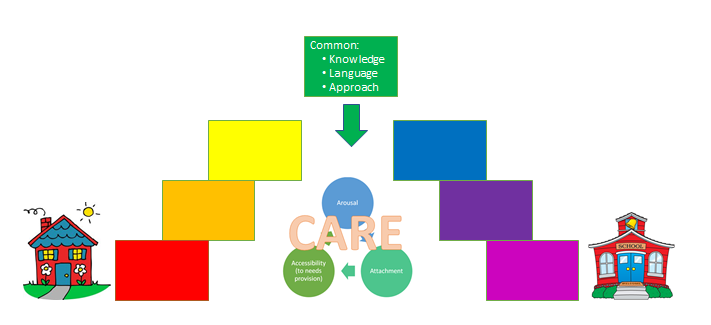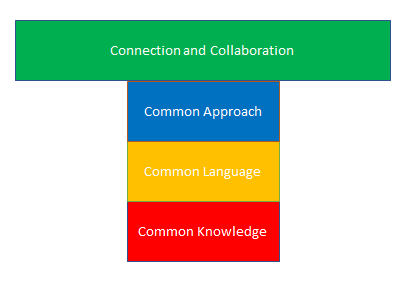
Three things you need to know about the child in your class who has experienced trauma at home, and what to do about it!
A Resource for Trauma Informed Practice in Schools
By Colby Pearce
Get a free introduction to the resource here!
Welcome! If you have landed here you probably share my interest in developing and supporting trauma informed practice in schools.
I developed this resource because all children need consistency, but some need it more than others. Children who have experienced trauma at home need consistent approaches to their care and management between home and school. Inconsistency extends the uncertainty experienced by these children about what to expect of adults in caregiving roles, which developed in conditions of inconsistent and inadequate care. Inconsistency is a central nervous system irritant that impairs (new) learning and behaviour.
This resource extends my endeavours to support trauma informed, therapeutic care environments to the school environment. My two programs, the Triple-A Model of Therapeutic Care and the CARE Therapeutic Framework, are already being implemented in support of therapeutic care in Ireland and Australia. My book, A Short Introduction to Attachment and Attachment Disorder (Second Edition), is used in teaching and training professionals and lay persons alike, and is seen as an ideal starting point for those who care for children recovering from a tough start to life and professionals who interact with them and their carers.
After reading this resource you will
- have a conceptual framework for understanding the impact of trauma at home on the developing child;
- be able to develop and implement a plan to support their recovery based on familiar aspects of caregiving and relating;
- be able to problem-solve in relation to ongoing behaviours of concern and implement practical steps to address them; and
- be able develop and implement a practical self-care plan that supports your best efforts on behalf of children and young people who have experienced trauma at home, and positive outcomes for them.
Most importantly, it is my sincere hope that this resource will support effective communication between home and school based on shared knowledge and language, and enrich children’s experience of consistency via a shared approach. Speaking the ‘same language’ supports communication and relationships, and relationships are the key to addressing the effects of trauma at home.

I wish you well in your endeavours and hope that this resource:
- confirms and validates what you already know and already do; and
- enriches, in some way, your knowledge and approach to the care and management of children who have experienced trauma at home.
About me:

I am a Clinical Psychologist with almost thirty-years-experience as an applied researcher, clinician, writer and trainer in child and adolescent mental health and child welfare. For almost all my working life I have offered professional services to children and young people who have experienced trauma at home, and adults who interact with them in various roles (including parents, foster carers, kinship carers, residential carers, adoptive parents, teachers, social workers, youth workers, and judicial officers). I am the author of the Triple-A Model of Therapeutic Care, which is entering its fourth year as the primary therapeutic model of care among TUSLA (Child and Family Agency) general and relative foster carers in County Donegal, Ireland. I am also the author of the CARE Therapeutic Framework, which is currently being implemented in the Department for Child Protection (DCP) Kinship Care Program in South Australia.
In my working life I have observed statutory child protection, alternative care and education institutions struggle to consistently meet the significant needs of children who have experienced trauma at home. Notwithstanding the best intentions and efforts of those who interact with these children in care and management roles, relationship breakdowns and changes in care and/or education placements are all-to-familiar experiences for them. Frequently, these children are denied basic fundamentals, such as a stable home and education placement.
Though there is no shortage of information that describes the impact of trauma at home on the developing child, this knowledge either does not translate well into practical and feasible care and management practices or there is an apparent reluctance to deviate from widely-implemented, conventional care and management practices. This led me to develop practical, user-friendly and back-to-basics approaches for the care and management of these deeply hurt and, often, troubled children that are confined to conventional aspects of caregiving and relating and address the impacts of, and support recovery from, trauma at home.

Details:
Authored By: Colby Pearce
Pages: 45 (A4 – 13,600 words)
Contents:
- Prologue: Punishment is Problematic
- Introduction
- Part 1: Three things you need to know about the impact of trauma at home
- Part 2 – Addressing the impact of trauma at home on functioning and performance at school
- Part 3 Addressing Behaviours of Concern Using the CARE Model
- Part 4: Adopting a balanced view
- Part 5: Take care of yourself too!
- Further Reading

For Individual Purchasers – School Resource
Buy it now and we will email your personalised copy of the resource (Please allow up to 2 business days for us to respond to your payment).
A$16.50

For Group/Organisational Purchasers (up to 10 employees) – School Resource
Buy it now and we will email your personalised copy of the resource (Please allow up to 2 business days for us to respond to your payment).
A$55.00

For Group/Organisational Purchasers (11-20 Employees) – School Resource
Buy it now and we will email your personalised copy of the resource (Please allow up to 2 business days for us to respond to your payment).
A$110.00

For Group/Organisational Purchasers (21-30 employees) – School Resource
Buy it now and we will email your personalised copy of the resource (Please allow up to 2 business days for us to respond to your payment).
A$220.00









